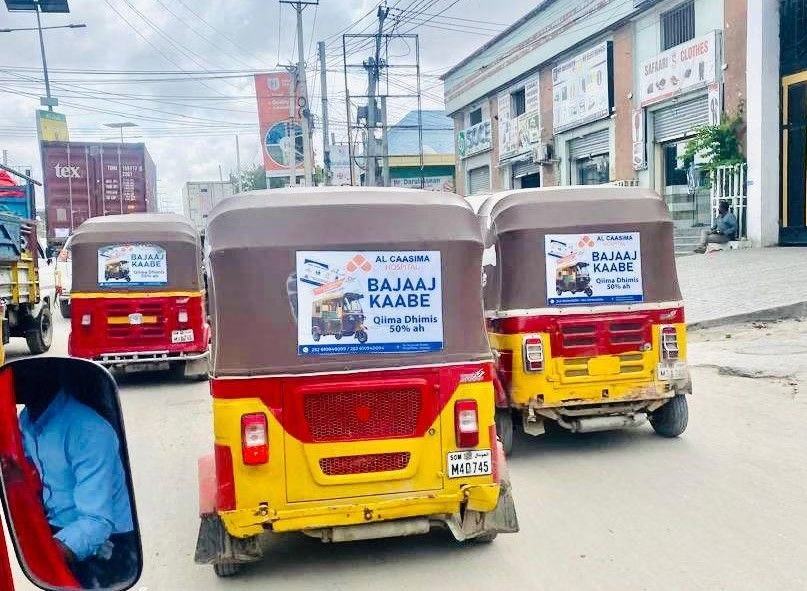
How do you bring essential healthcare to Somalia’s most marginalised? The Swiss Agency for Development and Cooperation (SDC)-funded Private Sector Partnerships for Health (PSPH) programme, implemented by DT Global, has an innovative answer: Bajaj Kaabe. These ubiquitous three-wheeled taxis now champion healthcare, bringing affordable medical access to hard-to-reach communities in Mogadishu. With over 2,600 drivers enrolled and thousands benefiting from discounted care at an annual fee of $5, this model is rapidly reshaping care and inspiring new health financing solutions.
The PSPH programme pioneers the Market Systems Development approach, aiming to improve access to affordable, quality healthcare through Somalia’s private sector, despite the fragile context. While Somalia’s public health system remains donor-dependent, private providers deliver 75-80% of healthcare services. PSPH uniquely engages the commercial private sector, using only technical assistance to foster sustainable, locally-owned solutions.
‘Bajaj Kaabe’ (‘Kaabe’ meaning ‘support’) targets Bajaj taxi drivers and their families, critical yet overlooked members of Mogadishu’s urban landscape. Despite their indispensable role, these drivers, predominantly male daily earners, often forego formal healthcare due to cost misconceptions and a lack of tailored financial products. A 2022 study highlighted drivers' reliance on self-medication and delayed medical consultations, perpetuating avoidable health issues.
PSPH identified key market failures limiting Bajaj drivers' access to healthcare, including information gaps and the absence of affordable insurance products. Partnering with Al Assima Hospital in Mogadishu, PSPH facilitated the development and launch of the Bajaj Kaabe membership initiative. Drivers now pay a $5 annual fee for discounted services, improving access and affordability. To date, 1,746 drivers have fully registered, and 1,139 drivers and their families have already used the services. Al Assima Hospital aims to reach 10,000 drivers within a year.
PSPH is also collaborating with Baraka Takaful Insurance, a private health insurer offering Somalia’s first mass-market insurance product. They are exploring how the Bajaj discount model can evolve into a prepaid insurance plan, leveraging driver associations to aggregate demand and streamline client acquisition.
The initiative represents a profound shift. Providers now recognise Bajaj drivers as a viable market, offering tailored healthcare products. This leads to increased patient numbers, fostering business growth and investment, while simultaneously meeting the healthcare needs of low-income populations. Inspired by Mogadishu’s success, Siraaj Hospital in Borama, Somaliland, is developing a similar package, aiming initially to cover 1,800 drivers with affordable monthly subscriptions.
Insurance companies, supported by PSPH, are encouraged to tap into this underserved segment by creating targeted health packages. This not only increases their client base but also broadens their risk pools efficiently.
For Bajaj drivers and their extensive networks, predictable access to affordable care reduces financial shocks and curbs self-medication practices. Improved health-seeking behaviours, combined with increased financial literacy and proactive health management, enhance overall workforce productivity and community well-being.
Bajaj Kaabe embodies the Market Systems Development principles of systemic impact, scalability, and sustainability through light-touch facilitation. Beyond immediate healthcare access, the initiative stimulates product innovation, encouraging private providers and insurers to refine offerings specifically for low-income informal workers.
PSPH continues supporting insurers to enhance and market affordable health insurance tailored to drivers, increasing relevance and accessibility for diverse populations. Concurrently, the programme boosts service quality, efficiency, and private healthcare value. This involves training providers on clinical best practices, customer care, and hospital management to ensure inclusive, quality services even in challenging environments.
The PSPH approach prioritises market-driven solutions, relying solely on technical assistance without external funding. This creates permanent indigenous capacity, maximises the impact of SDC’s investment, and serves as a scalable model for addressing public health needs. In doing so, PSPH uniquely contributes to a pluralistic, sustainable healthcare system.
The PSPH programme is implemented by DT Global, with essential local support from the Somali Research and Development Institute and technical expertise from the Swiss Tropical and Public Health Institute. Its lean, dedicated teams operate from DT Global’s Africa headquarters in Nairobi, with field offices in Mogadishu and Hargeisa.
Through Bajaj Kaabe, PSPH is redefining healthcare access and demonstrating the transformative potential of local solutions. It highlights a pragmatic pathway toward sustainable healthcare, significantly enhancing Somali health systems and empowering communities through strategic private-sector engagement.
This blog was first published on the Swiss Agency for Development and Cooperation Health Network website.